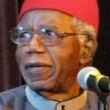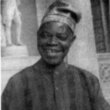The open sore of a continent: a personal narrative of the Nigerian crisis
Description
On November 10, 1995, the Nigerian military government under General Sani Abacha executed dissident writer Ken Saro-Wiwa along with eight other activists, and the international community reacted with outrage. From the Geneva based International Commission of Jurists (who called the executions a criminal act of state murder) to governments around the world (including the United States) who recalled their ambassadors, to the Commonwealth of Former British Colonies, who suspended Nigeria from the group, the response was quick, decisive, and nearly unanimous: Nigeria is an outcast in the global village. The events that led up to Saro-Wiwa's execution mark Nigeria's decline from a post-colonial success story to its current military dictatorship, and few writers have been more outspoken in decrying and lamenting this decline than Nobel Prize laureate and Nigerian exile Wole Soyinka. In The Open Sore of a Continent, Soyinka, whose own Nigerian passport was confiscated by General Abacha in 1994, explores the history and future of Nigeria in a compelling jeremiad that is as intense as it is provocative, learned, and wide-ranging. He deftly explains the shifting dramatis personae of Nigerian history and politics to westerners unfamiliar with the players and the process, tracing the growth of Nigeria as a player in the world economy, through the corrupt regime of Babangida, the civil war occasioned by the secession of Biafra under the leadership of Chief Odumegwu Ojukwu, the lameduck reign of Ernest Sonekan, and the coup led by General Sani Abacha, arguing that "a glance at the mildewed tapestry of the stubbornly unfinished nation edifice is necessary" to explain where Nigeria can go next. And, in the process of elucidating the Nigerian crisis, Soyinka opens readers to the broader questions of nationhood, identity, and the general state of African culture and politics at the end of the twentieth century. Here are a range of issues that investigate the interaction of peoples who have been shaped by the clash of cultures: nationalism, power, corruption, violence, and the enduring legacy of colonialism. In a world tormented by devastation from Bosnia to Rwanda, how do we define a nation: is it simply a condition of the collective mind, a passive, unquestioned habit of cohabitation? Or is what we think of as a nation a rigorous conclusion that derives from history? Is it geography, or is it a bond that transcends accidents of mountain, river, and valley? How do these varying definitions of nationhood impact the people who live under them? Soyinka concludes with a resounding call for international attention to this question: the global community must address the issue of nationhood to prevent further religious mandates and calls for ethnic purity of the sort that have turned Algeria, Rwanda, Bosnia, and Sri Lanka into killing fields. Soyinka brings a lifetime of study and experience to bear on his writing, combining the skills of a poet and playwright with the astute political observations of a seasoned activist. An important and timely volume, The Open Sore of a Continent will be required reading for anyone who cares about Africa, human rights, and the future of the global village.
More Details
ISBN
9780195105575
Excerpt
Loading Excerpt...
Similar Titles From NoveList
NoveList provides detailed suggestions for titles you might like if you enjoyed this book. Suggestions are based on recommendations from librarians and other contributors.
The invisible Arab: the promise and peril of the Arab revolution - Bishara, Marwan
These books have the subjects "political activists," "nationalism," and "political science."
These books have the genre "life stories -- arts and culture -- writing -- authors"; and the subjects "state-sponsored terrorism," "authoritarianism," and "political activists."
These books have the genre "history writing -- africa"; and the subjects "african people" and "african history."
These books have the subjects "state-sponsored terrorism," "authoritarianism," and "dictatorship."
These books have the subjects "state-sponsored terrorism," "authoritarianism," and "political science."
These books have the genre "history writing -- africa"; and the subjects "political activists," "political science," and "politics and government."
These books have the appeal factors scholarly, and they have the genre "history writing -- africa"; and the subjects "political science" and "politics and government."
These books have the subjects "political science" and "politics and government."
Dancing in the glory of monsters: the collapse of the Congo and the great war of Africa - Stearns, Jason K
These books have the genre "history writing -- africa"; and the subjects "state-sponsored terrorism," "war and society," and "political science."
These books have the genres "autobiographies and memoirs" and "history writing -- africa."
These books have the subjects "state-sponsored terrorism," "authoritarianism," and "war and society."
These books have the genre "history writing -- africa"; and the subjects "state-sponsored terrorism," "authoritarianism," and "nationalism."
Similar Authors From NoveList
NoveList provides detailed suggestions for other authors you might want to read if you enjoyed this book. Suggestions are based on recommendations from librarians and other contributors.
Nigerian novelists, memoirists, and essayists Ben Okri and Wole Soyinka are two of the major African authors of the past century. Soyinka's impassioned fiction is predominantly realistic and generally set in Nigeria, while Okri's own voices books often use magical realism in settings that may be real or mythological. -- Michael Shumate
Although different in their subject matter, Tanzanian-British novelist Abdulrazak Gurnah and Nigerian author Wole Soyinka will forever be joined as the first two Black African Nobel Prize winners. Both write character-driven literary fiction, but Gurnah writes of Africans abroad, while Soyinka focuses on Nigeria in his impassioned novels and non-fiction. -- Michael Shumate
Chinua Achebe and Wole Soyinka are prominent among the first generation of Nigerian writers to emerge as European colonialism ended. Both authors write novels and memoirs that span Nigeria's colonial and independent eras. Their books evoke rural and tribal life, portray its destruction by outsiders, and critique their country's later era of independence. -- Michael Shumate
These authors' works have the genre "literary fiction"; and the subjects "politics and government" and "political prisoners."
These authors' works have the genre "political fiction"; the subjects "authors, nigerian," "west african people," and "african people"; include the identity "black"; and characters that are "flawed characters."
These authors' works have the genre "arts and entertainment"; and the subjects "politics and government," "political prisoners," and "political imprisonment."
These authors' works have the appeal factors richly detailed, and they have the genres "literary fiction" and "political fiction"; and the subjects "authors, nigerian," "political prisoners," and "postcolonialism."
These authors' works have the genres "autobiographies and memoirs" and "life stories"; and the subjects "authors, nigerian" and "political activists."
These authors' works have the appeal factors strong sense of place, stylistically complex, and evocative, and they have the genres "literary fiction" and "psychological fiction"; the subjects "authors, nigerian," "postcolonialism," and "authors, trinidadian"; and characters that are "flawed characters."
These authors' works have the subjects "authors, nigerian," "political activists," and "political prisoners."
These authors' works have the appeal factors own voices, and they have the genres "literary fiction" and "political fiction."
These authors' works have the appeal factors strong sense of place, thought-provoking, and own voices, and they have the genres "literary fiction" and "political fiction"; the subjects "political prisoners," "physicians," and "dissenters"; and characters that are "complex characters."
Reviews from GoodReads
Loading GoodReads Reviews.
Staff View
Loading Staff View.






























